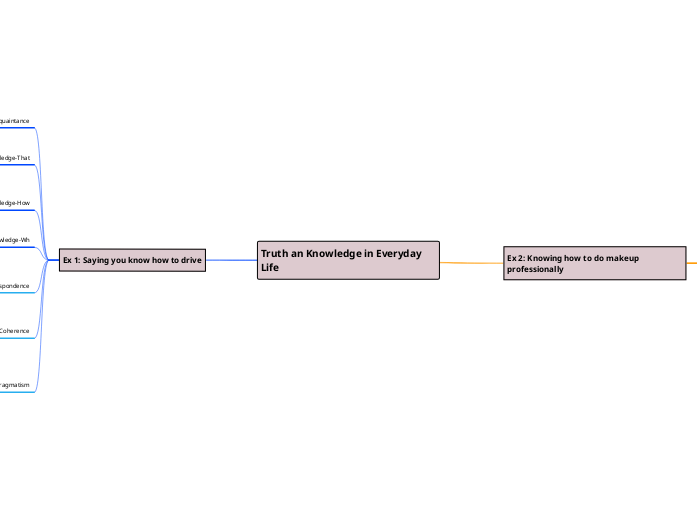Truth an Knowledge in Everyday Life
Ex 2: Knowing how to do makeup professionally
Knowledge by Acquaintance
Working in at a makeup studio under a mentor that can supply you with authentic hands on experience so that you may obtain direct experience in order to gain knowledge.
Knowledge-That
Claiming that you know how to do makeup professionally is very different than actually being able to do so.
Once you have claimed to have this skill it is vital that it is proved with evidence.
Knowledge-How
Through taking courses/ and (or) learning from mentors you obtain the skill and abilities that allow you to professionally do makeup.
Identifying that practice is how you better the skills and your knowledge.
Knowledge-Wh
Propositional because they must supply evidence for their claims. If you claim to know how to professionally do makeup then there should have the ability to prove that - the same regards to "weather" they can or not.
Correspondence
Everyone knows that the makeup industry is rapidly growing and standard of service and skills has been raised therefor you must meet the requirements that is expected but majority of populations to make any claims regarding knowing how to do professional makeup.
Coherence
Professional makeup artists attend school or courses to acquire a license for this practice, and to be labeled a professional you must again meet the standards of what considers you a professional rather than someone who simply works in the makeup industry.
Most people expect a highly flawless outcome for a professionally done makeup look entailing that this credential is important to achieve when making a claim such as knowing how to do makeup professionally.
Pragmatism
This statement contains relevance to the world in a sense that we are seeking truth regarding what classifies you as a professional and have you met the criteria to solidify it as truthful.
If there are standards for what classifies one as a makeup professional, do they have the same standards for other claims ?
Ex 1: Saying you know how to drive
Knowledge by Acquaintance
Being the passenger of an experienced driver acquiring knowledge about road adequate and rules.
More directly being behind the wheel and actively driving is knowledge obtained directly through experience.
Knowledge-That
Declaring that you know hoe to drive without any actually experience behind the wheel.
You may have extensive knowledge about driving but to know how to drive you must actively do so rather than claiming to know.
Knowledge-How
To identify the sources of knowledge such as teachers, practice and experience.
If someone has taught you how to drive you have obtained your how thought them along with practicing your skills such as controlled turned and parallel parking. Through being taught, experience and practice is how you know how to drive.
Knowledge-Wh
Acquiring knowledge about driving and whether they can is a difference that determines extent of truthfulness based on knowledge
Correspondence
Claiming you know how to drive must correlate with what society and the world thinks that entails. It needs to correlate with the overall standards of what does it mean to know how to drive.
Coherence
Majority of people would claim that knowing how to drive infers that you yourself have been behind the wheel operating the vehicle therefore this would be the credentials to meet when making such a claim.
Pragmatism
It has relevance to the world because a claim such as knowing how to drive holds large value as it infers that you can safely operate a vehicle, but if you are granted the ability to drive after making a claim and you have never driven it can cause accidents, injuries and casualties.
